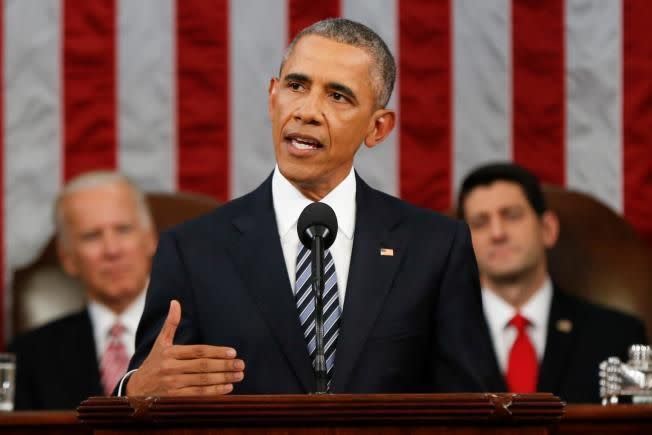State of the Union’s Technology? What Obama Didn’t Say

A State of the Union speech with a core message of “everyone chill the [bleep] out” was always going to be light on policy specifics: When you’re reminding the audience that the world is not in fact on fire, bullet-point particulars can only serve as distractions.
So in last night’s address, President Obama nodded only briefly at such tech-policy priorities as net neutrality and expanded Internet access. (“We’ve protected an open Internet and taken bold new steps to get more students and low-income Americans online”). That left plenty of other technology-related issues unmentioned; “tech” only appears twice in the entire text of the speech.
That doesn’t mean, however, that those unmentioned issues won’t come up in the near future.
Net neutrality
The tech-policy plank to get the most public nod from Obama is also widely reviled among Republicans as an exercise in market-distorting government overreach. But I question the viability of an argument that asks voters to trust phone or cable companies that many resent and most can’t fire.
I also wonder about the odds of net-neutrality foes sinking their own argument with such exercises in Net Neutrality Derangement Syndrome as a full-page newspaper ad comparing Federal Communications Commission chairman Tom Wheeler to China’s Internet censors.
Reminder, everybody: Net-neutrality rules regulate Internet providers, not Internet publishers or Internet users.
Encryption
Obama’s speech was notable for its lack of the usual dog-whistling about the dangers of encrypted communications. The president did note, correctly, that terrorists “use the Internet to poison the minds of individuals inside our country” — but he didn’t complain about them doing so secretly or untraceably.
Other politicians, however, are more than happy to say just that. They may be even more likely to do so after the administration releases its overdue policy statement about encryption. That, in turn, may force more of Obama’s would-be successors to clarify their views: While Bernie Sanders and Rand Paul have been steadfast in opposing government-mandated backdoors in encryption, Ted Cruz and Marco Rubio haven’t spelled out where they stand and Hillary Clinton and Donald Trump have been even vaguer.
This discussion may also get more interesting as foreign governments such as those in London and Paris consider measures that would compel U.S. firms like Apple to compromise their own encryption. Does this issue look different when it involves foreigners bossing around Americans?
Self-driving cars
Some reporters were led to believe that self-driving cars (especially the regulatory environment around them) would get some time in the address. No such thing happened — and I can see why.
On the one hand, the technology just hasn’t reached the point in its development where most Americans have to worry about seeing self-driving vehicles on their daily commute. The companies testing them would most likely agree, to judge from reports they recently filed with the California Department of Motor Vehicles about software “disengagement” issues that required a human driver’s intervention.
On the other hand, what politician wants to tell voters to just accept the fact that robots will be better drivers than they are? (It’s true, and I for one will welcome our new robot-driver overlords — especially if they take over the roads before my five-year-old reaches driving age.)
Drones
This is another no-win issue for a politician to take on. To judge from most public feedback, and certainly from commenters here on Yahoo Tech, the unmanned aerial vehicle is the new black helicopter: The amount of suspicion and outright paranoia these things inspire is off the charts.
Drone manufacturers seem to have realized they have a bit of an image problem, to judge from their cooperation and public support for the Federal Aviation Administration’s drone-registration program. (By January 6, more than 181,000 people had complied.) But there’s a lot of work to be done before anybody seeking election will get many votes by defending the innovative possibilities of consumer drones.
Patent reform
President Obama gave this issue a major shout-out in 2014’s SOTU. But after two years of Congressional inaction, it didn’t get even a passing mention Tuesday night. That’s too bad, because startups and established businesses continue to get shaken down with bogus threats of patent-infringement lawsuits from companies that exist only to engage in patent extortion.
And it’s one of the rare issues on which you won’t find an immediate and automatic split among Democratic and Republican lines. On on this one, you have to set aside the usual partisan frames — which, as I recall, somebody told the country just last night we should do more often.
Email Rob at rob@robpegoraro.com; follow him on Twitter at @robpegoraro.


